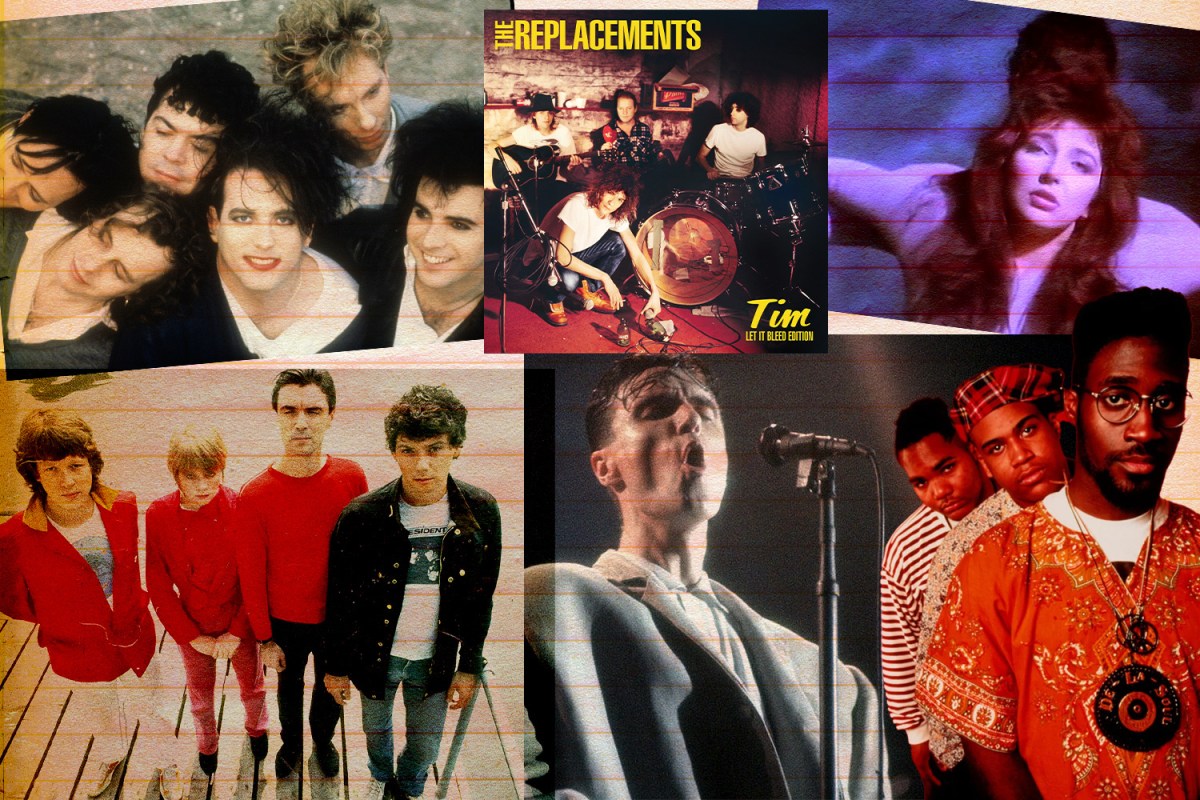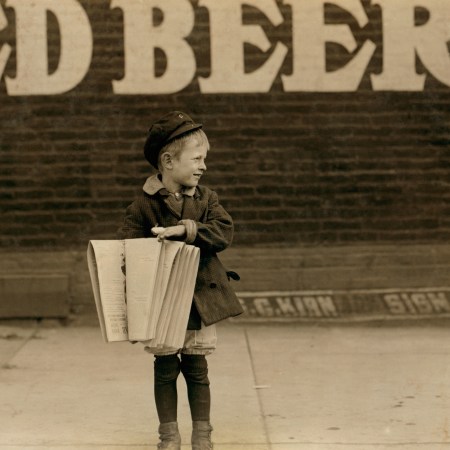One of 2023’s hottest tours was The Cure, whose “The Shows of a Lost World” outing was a career peak from the long-running goth institution, grossing $37.5 million. This achievement is even more impressive if you keep in mind that frontman Robert Smith fought to keep ticket prices reasonably low, and even hectored Ticketmaster into partially refunding fans for the sort of excessive ticket fees we’ve all woefully accepted as inevitable.
One of this fall’s hottest films is the A24 re-release of the seminal 1984 Talking Heads concert film Stop Making Sense, which has earned rave reviews for the stunning new remaster (you can now see David Byrne’s sweat droplets with the clarity they deserve) and for capturing a great band at their joyful, jittery and adventurous best. This event has led to the famously estranged members of Talking Heads actually appearing in a room together like people who can somewhat stand each other, even dropping by late night television for a fascinating and not-at-all tense chat.
Oh, and over at Metacritic, the year’s highest rated album is the massive Tim (Let It Bleed Edition) box set, featuring a revelatory, if not downright heroic, new mix of The Replacements’ best albums, which is now officially one of the greatest albums of all time.
Those are just three recent, high-profile examples, as the past few years have seen a number of musical heroes of Generation X step back into the spotlight with a vengeance. Thanks to Stranger Things, Kate Bush, alternative rock’s original wacky aunt, is more popular than ever (it is difficult to fully articulate how strange it is to hear “Running Up That Hill (A Deal with God)” in a Lyft right between Dua Lipa and BTS), and now she will finally be inducted into the Rock & Roll Hall of Fame. And as demonstrated by Our Flag Means Death, her ability to destroy you with the right song placement remains undefeated.
This year has also seen rap fans both celebrate that De La Soul, one of the most innovative hip-hop groups of all time, finally saw their catalog become available on streaming after years of record industry hold-ups, and also mourn the sudden, terribly unfair passing of founding member Trugoy the Dove. There’s also the matter of the year-long celebration of hip-hop’s 50th birthday, and the attendant hand-wringing about how the ultimate youth culture musical form will navigate middle age. And we’d be remiss not to mention that the R.E.M. reissue campaign continues to glide along smoothly with the upcoming release reissue of Up, arguably one of the most underrated works, all while The Bear has, delightfully, found its final form as a R.E.M. mixtape in television form.
There’s more here than just coincidental timing from the nostalgia industry and alternative rock continuing to age into a version of the classic rock it was meant to replace. It’s both years overdue and seemed unlikely to ever happen, but Generation X has finally started the process of culturally supplanting their eternal nemesis the Baby Boomers. Here they are now. Don’t worry, they have every intention of entertaining you.
We’ve been in need of some new wise elders for a while now, as the institutional musical heroes the Boomers propped up can’t seem to stop showing their asses of late.
It’s hard to know where to begin, but let’s go with Eric Clapton, who recently helped raise $2.2 million for his fellow anxi-vax bro, Presidential candidate Robert F. Kennedy, Jr (aka the real-life Connor Roy). He’s also been dealing with his resurfaced onstage racist rant from 1976, which he has apologized for, even if his levels of self-awareness still seem concerningly low. Then there’s his fellow anti-vaxxer Van Morrison, who seems to have moondanced his way into some sort of conspiracy theory rabbit hole in recent years, as evidenced by the fact that he wrote several anti-lockdown songs calling into question proven COVID facts, and then followed it up with a song called “They Own the Media.”
But if you are looking for a stand-in for The Fall of the Boomers, you couldn’t really find a better one than the disgraced Rolling Stone co-founder Jann Wenner. It’s an arc so neat, he probably admires it on some level.
Following his instantly infamous interview with New York Times writer David Marchese, in which he defended not including Black and female artists in his career-spanning interview collection The Masters by saying “Insofar as the women, just none of them were as articulate enough on this intellectual level.” The outrage was so immediate that both of the cultural institutions he helped create, Rolling Stone and the Rock & Roll Hall of Fame took steps to distance themselves from him. Those remarks were indefensible, and indicative of the sort of hypocrisy and reflexively brittle self-centeredness that the Baby Boomers have often been accused of, as the sex, drugs and rock ‘n’ roll generation that was supposed to save the world aged into a generation that consistently votes for leaders that fight progress at every turn. In the same interview, Wenner noted that he couldn’t really think of any way in which his generation lost its way.
Rock & Roll Hall of Fame Foundation Removes Jann Wenner From Board of Directors
The removal followed a controversial New York Times interviewNow, a few caveats.
Obviously, #NotAllBoomers are the same, as Bob Dylan and Paul McCartney are beams of light in the world who would never disgrace themselves like Van, while Neil Young and Joni Mitchell, both survivors of childhood polio, pulled their music from Spotify to protest the tendency of Joe Rogan, the streaming company’s golden goose, to spread vaccine misinformation. And while we may be in the beginning of the process of, as a culture, no longer accepting that the entirety of popular music revolves, at it core, around the heroes of the ‘60s and ‘70s, our politics very much remain a gerontocracy, as exemplified by the elderly men who will most likely be on the Presidential ballot next year, like it or not. (And most people do not.)
Television, film, recorded music and even the very idea of popular culture all existed well before the post-war Baby Boomer generation arrived in the late ‘40s and into the ‘50s. Historians differ on the topic, but the idea of an agreed-upon mass popular culture is generally believed to have started in the 1920s. Real flapper vibes. But the Boomers were the ones who grew up with color television, rock ‘n’ roll (even if they often misunderstood its origins as Black music) and lifestyle-based advertising that sold the idea that as long as you bought the right products, you could be part of youth culture and, therefore, finally be cool. The Baby Boomers have always viewed themselves as the center, if not the creators, of pop culture, and have been loath to cede the spotlight, even as they began the long march from upstart hippies to rulers of the yuppie establishment. (They’ve also been loath to cede other things.)
Growing up, many members of Generation X had to constantly contend with the lingering ambient suggestion that their music wasn’t as good as what their parents had, that rap didn’t even count as music and MTV ruined everything. It was entirely possible to both love a lot of what your parents did (disliking the Beatles is the dumbest form of performative contrarianism possible) while pushing back against all of this.
We can again turn to Wenner as a handy synecdoche for this generational idea. Rolling Stone has always had a vibrant staff of voracious listeners and journalists who pushed for as broad a definition of pop culture as the times would allow. But there’s legions of stories from former staff members who butted up against Wenner’s ’60s-centric, problematic worldview and tendency to put his friends on the cover even if their latest album stinks, and even as recently as last year he found it “far-fetched” to compare Kurt Cobain to the Beatles. Meanwhile, Wenner’s Rock Hall has seemingly inducted every single ’60s musical icon (except for the goddamn MC5) while it has taken decades for Generation X’s The Cure and Kate Bush to get their due, to say nothing of A Tribe Called Quest, Iron Maiden, Sonic Youth, Tori Amos and innumerable others.
It’s been posited that one of the reasons behind the overdue social changes and widespread discussions about race, gender and class that innumerable young people participated in and pushed forward last decade was that while Generation X, or at least its more ethical cohorts, opposed the materialism and hypocrisy of the Boomers, they didn’t have the numbers or power to displace them. But the Millennials had both the numbers and the social media tools to take the Boomers on directly. And with a passing of the guard that institutional power could delay but not prevent, some cultural reappraisals and reckonings, and some above mentioned forced errors, we have finally begun to see the Boomers begin to move on from their perch.
Millennials had the clout to, pretty much instantly, place their heroes at the center of the culture, which is all well and good, and I don’t expect the world to ever stop revolving around Taylor Swift. But we are also seeing Gen X icons finally receive their proper stature; as recently as 10 years ago one would have gotten a lot more cultural pushback for stating that The Cure are as great as any non-Beatles band, or Kate Bush is as visionary as any musician you could care to name.
Taste is, of course, subjective, though this is all really thrilling for people who grew up watching 120 Minutes. But what truly heartens me about this development is that while it’s always possible that Gen X’s heroes will have a Van Morrison-like heel turn, I believe they will be relatively rare. (I said rare. I am well aware of what Morrissey has become, but let us leave that beautiful man Johnny Marr out of it.) Those who grew up in the Boomers’ shadows watched as the former radicals flocked to the suburbs and began to prioritize their comfort and bank accounts over their youthful ideals. But their children, metaphorically and otherwise, were far more willing to see the world, and their own flaws, more clearly, and are still acting as such, from David Byrne apologizing for wearing blackface and also covering Janelle Monae’s Black Lives Matter anthem “Hell You Talmbout” to The Cure’s Robert Smith standing up against Ticketmaster when most classic rock artist ticket prices balloon past three digits, to Rage Against the Machine guitarist Tom Morello seemingly showing up at every labor protest, big or small. Not being wildly self-absorbed or solipsistic continues to be a power move.
Generation X was always consumed with the fear of selling out, and while that’s a fraught concept that at the time didn’t account for the difficulty of paying one’s bills, in terms of not compromising one’s values, many high-profile members have stayed true. So congrats, we did it everyone.
But let’s be a bit careful with the victory lap. A generation that fought against their elders’ gatekeeping, harmful prejudices and ideas about “real music,” should remember how frustrating that feeling was, and show grace to those who came after. I sometimes see troubling grumbles from people around my own age about, say, K-Pop or Urbano music (just because something isn’t your thing doesn’t mean it lacks cultural value) and in a streaming world with more options and shorter attention spans than ever, it can often feel like new artists are in unfair competition with the past. (As a person who likes to write about young bands in order to give them a spotlight, I can say it gets harder and harder to place a piece about a non-superstar, which is not good for music or culture as a whole.) There’s only so much one can do about this, but starting with some honest self-reflection is always the right move.
So Generation X, be happy for your moment, but try to remember the mistakes of the past, and try to show your figurative children the grace your figurative parents denied you. Or to quote one of your greatest singers’s Golden Rules, remember that if you hate something, don’t you do it too.
This article was featured in the InsideHook newsletter. Sign up now.















